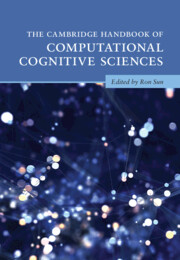Book contents
- The Cambridge Handbook of Computational Cognitive Sciences
- Cambridge Handbooks in Psychology
- The Cambridge Handbook of Computational Cognitive Sciences
- Copyright page
- Contents
- Preface
- Contributors
- Part I Introduction
- Part II Cognitive Modeling Paradigms
- 2 Connectionist Models of Cognition
- 3 Bayesian Models of Cognition
- 4 Symbolic and Hybrid Models of Cognition
- 5 Logic-Based Modeling of Cognition
- 6 Dynamical Systems Approaches to Cognition
- 7 Quantum Models of Cognition
- 8 Constraints in Cognitive Architectures
- 9 Deep Learning
- 10 Reinforcement Learning
- Part III Computational Modeling of Basic Cognitive Functionalities
- Part IV Computational Modeling in Various Cognitive Fields
- Part V General Discussion
- Index
- References
2 - Connectionist Models of Cognition
from Part II - Cognitive Modeling Paradigms
Published online by Cambridge University Press: 21 April 2023
- The Cambridge Handbook of Computational Cognitive Sciences
- Cambridge Handbooks in Psychology
- The Cambridge Handbook of Computational Cognitive Sciences
- Copyright page
- Contents
- Preface
- Contributors
- Part I Introduction
- Part II Cognitive Modeling Paradigms
- 2 Connectionist Models of Cognition
- 3 Bayesian Models of Cognition
- 4 Symbolic and Hybrid Models of Cognition
- 5 Logic-Based Modeling of Cognition
- 6 Dynamical Systems Approaches to Cognition
- 7 Quantum Models of Cognition
- 8 Constraints in Cognitive Architectures
- 9 Deep Learning
- 10 Reinforcement Learning
- Part III Computational Modeling of Basic Cognitive Functionalities
- Part IV Computational Modeling in Various Cognitive Fields
- Part V General Discussion
- Index
- References
Summary
In this chapter, we review computer models of cognition that have focused on the use of neural networks. These architectures were inspired by research into how computation works in the brain. The approach is called connectionism because it proposes that processing is characterized by patterns of activation across simple processing units connected together into complex networks, with knowledge stored in the strength of the connections between units. We place connectionism in its historical context, describing the “three ages” of artificial neural network research: from the genesis of the first formal theories of computation in the 1930s and 1940s, to the parallel distributed processing (PDP) models of cognition of the 1980s and 1990s, and the advances in “deep” neural networks emerging in the mid-2000s. Transition between the ages has been triggered by new insights into how to create and train more powerful artificial neural networks. We discuss important foundational cognitive models that illustrate some of the key properties of connectionist systems, and indicate how the novel theoretical contributions of these models arose from their key computational properties. We consider how connectionist modeling has influenced wider theories of cognition, and how in the future, connectionist modeling of cognition may progress by integrating further constraints from neuroscience and neuroanatomy.
Keywords
Information
- Type
- Chapter
- Information
- Publisher: Cambridge University PressPrint publication year: 2023
References
Accessibility standard: Unknown
Why this information is here
This section outlines the accessibility features of this content - including support for screen readers, full keyboard navigation and high-contrast display options. This may not be relevant for you.Accessibility Information
- 4
- Cited by
